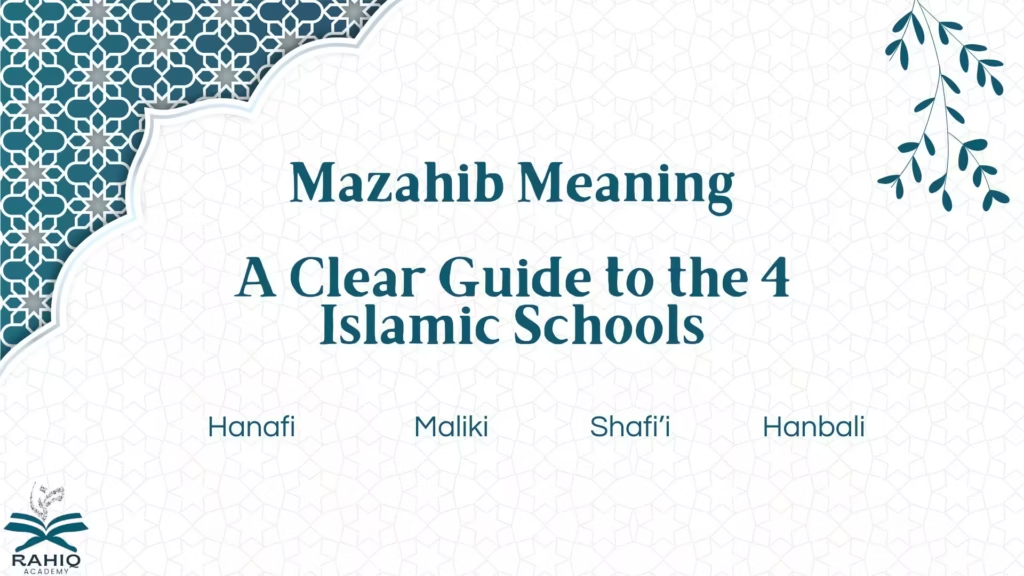Have you ever wondered about Mazahib meaning in Islamic jurisprudence? And how did these schools of thought, followed by millions around the world, come into being?
In this article, we will explore the emergence of the four major Islamic schools of thought throughout history, the reasons behind their differences, and how they influence our daily lives.
What is the meaning of Mazahib?
Mazahib meaning in Islamic jurisprudence, refers to a collection of scholarly interpretations made by a prominent Imam, along with the subsequent interpretations developed by his students based on the principles and foundations set by that Imam.
These rulings are based on a deep understanding of the Qur’an and the teachings of the Prophet Muhammad ﷺ.
Each madhhab (school of thought) provides a framework for interpreting religious texts and a clear methodology for deriving Islamic rulings, using tools such as consensus (ijmaʿ), analogy (qiyas), and juristic preference (istihsan).
The Islamic schools of thought began to appear in the second Hijri century. The most well-known mazahib are:
- The Hanafi Madhhab.
- The Maliki Madhhab.
- The Shafi’i Madhhab.
- The Hanbali Madhhab.
Definition of Usul al-Fiqh
To understand Mazahib meaning more deeply, it is essential to grasp the definition of Usul al-Fiqh and how these juristic schools were formed and continue to be relied upon by Muslims today.
In Islamic jurisprudence, the term “usul” (principles) is the plural of “asl,” which refers to a foundation upon which other rulings are built. An “asl” is essentially the root or base of something.
Therefore, Usul al-Fiqh refers to the foundational principles upon which Islamic legal rulings are based. These include sources such as the Qur’an, the Sunnah, qiyas (analogical reasoning), and other references used to derive and understand Islamic rulings.
The concept of “Asl” is also found in the Qur’an, as mentioned in the verse:
“أَلَمْ تَرَ كَيْفَ ضَرَبَ ٱللَّهُ مَثَلًۭا كَلِمَةًۭ طَيِّبَةًۭ كَشَجَرَةٍۢ طَيِّبَةٍ أَصْلُهَا ثَابِتٌۭ وَفَرْعُهَا فِى ٱلسَّمَآءِ ٢٤”
“Do you not see how Allah compares a good word to a good tree? Its root is firm and its branches reach the sky,”
What are Major Schools of Thought?
To better understand mazahib meaning, let us take a closer look at the major schools of thought and how each one developed its own methodology and set of principles.
Hanafi Madhhab
This is the earliest of the four schools and is attributed to Imam Abu Hanifa Al-Nu‘man, the only Tabi‘i (one who met the companions of the Prophet ﷺ) among the four Imams.
He was born in Kufa in 80 AH and died in Baghdad in 159 AH.
The Hanafi Madhhab is based on the following foundations (usul):
- The Holy Qur’an
- The Sunnah of the Prophet ﷺ
- The opinion of a companion.
- Personal reasoning (ijtihad) when no clear evidence is available.
Maliki Madhhab
This is one of the 4 Mazhab in Islam. It was founded by Imam Malik ibn Anas, and who was born in 93 AH and died in 179 AH in Madinah.
The Maliki Madhhab is based on:
- The Holy Qur’an.
- The Sunnah of the Prophet ﷺ.
- The actions and interpretations of the companions.
- Analogical reasoning (qiyas).
- Juristic preference (istihsan).
- Customs and traditions (ʿurf), as long as they are accepted by reason and human nature.
- Blocking the means (sadd al-dhara’iʿ), i.e., preventing actions that may lead to wrongdoing.
- Presumption of continuity (istishab), meaning a ruling remains in effect unless changed by valid evidence.
Shafi’i Madhhab
This school was founded by Imam Muhammad ibn Idris Al-Shafi’i, who was born in Gaza in 150 AH and died in 204 AH. He was a student of Imam Malik, may Allah have mercy on them both.
The Shafi’i Madhhab is based on
- The Book of Allah (Qur’an).
- The authentic Sunnah of the Prophet ﷺ.
- Consensus (ijmaʿ), which Imam Al-Shafi’i limited to what is known by necessity in the religion.
- The saying of a companion, if it was transmitted without disagreement; if the companions differed, he would choose the opinion closest to the Qur’an and Sunnah.
- Analogy (qiyas), by measuring a new issue against an existing ruling derived from the Qur’an, Sunnah, or companion consensus.
Hanbali Madhhab
The Hanbali Madhhab is the last of the four major schools and was founded by Imam Ahmad ibn Hanbal Al-Shaybani, a student of Imam Al-Shafi’i. He was born in Baghdad in 164 AH and died in 241 AH.
The Hanbali Madhhab is based on:
- The Holy Qur’an.
- The Sunnah of the Prophet Mohammed ﷺ.
- The fatwa of a companion, if there is no disagreement and no other text available.
- The opinion of the companion closest to the Qur’an and Sunnah when multiple views exist. If no clear preference, then differences are stated without choosing a specific view.
- Using weak or mursal (incompletely transmitted) hadith in the absence of other stronger sources.
- Analogy (qiyas) when the previous sources are not available.
- Blocking the means (sadd al-dhara’iʿ), to prevent actions leading to harm.
Factors Influencing the Formation of Mazahib
There are several factors influencing the formation of Mazahib, the most important of which are
- The companions of the Prophet ﷺ settled in different regions and founded schools of knowledge, which led to the development of different juristic opinions.
- Variations in customs and traditions across regions influenced how scholars interpreted and applied Islamic texts.
- Differences in scholars’ understanding of the Qur’an and Sunnah led to the formation of distinct legal schools.
- The growing number of Muslims and the expanding Islamic state required clearer legal interpretations, which encouraged scholars to systematize their methods and establish schools.
- Political and social turmoil after the death of the Prophet ﷺ affected society and, in turn, shaped the perspectives and rulings of jurists.
Importance and Relevance
The Islamic schools of thought are highly important in understanding and applying the teachings of Islam in both personal and community life. Among the key importance and relevance of Mazahib are
- Deriving Islamic rulings from the Qur’an and Sunnah.
- Applying Islamic law to various areas of life.
- Helping individuals understand and practice Islamic jurisprudence.
- Assisting scholars in deriving new rulings when needed.
Contemporary Practice
There is a branch in Islamic jurisprudence known as fiqh mu‘asir (contemporary jurisprudence), and it is one of the key areas of contemporary practice. It focuses on studying modern legal issues and ongoing developments.
Contemporary fiqh aims to apply Islamic rulings to new issues in fields such as technology, economics, media, and many other areas that did not exist during the time of the Prophet ﷺ.
The traditional Islamic schools of thought have played a significant role in shaping contemporary fiqh by providing it with a solid scholarly framework based on established principles.
Conclusion:
In this article, we explored the Mazahib meaning, their origins, and the reasons behind their diversity. These schools reflect the depth and richness of Islamic jurisprudence, helping us apply Sharia in both traditional and modern contexts.
If you want to deepen your understanding of Islamic law from trusted sources, Rahiq Academy offers online courses led by qualified scholars in Qur’an, Fiqh, and Hadith.
Join today and strengthen your knowledge of Islam.




